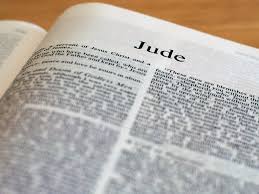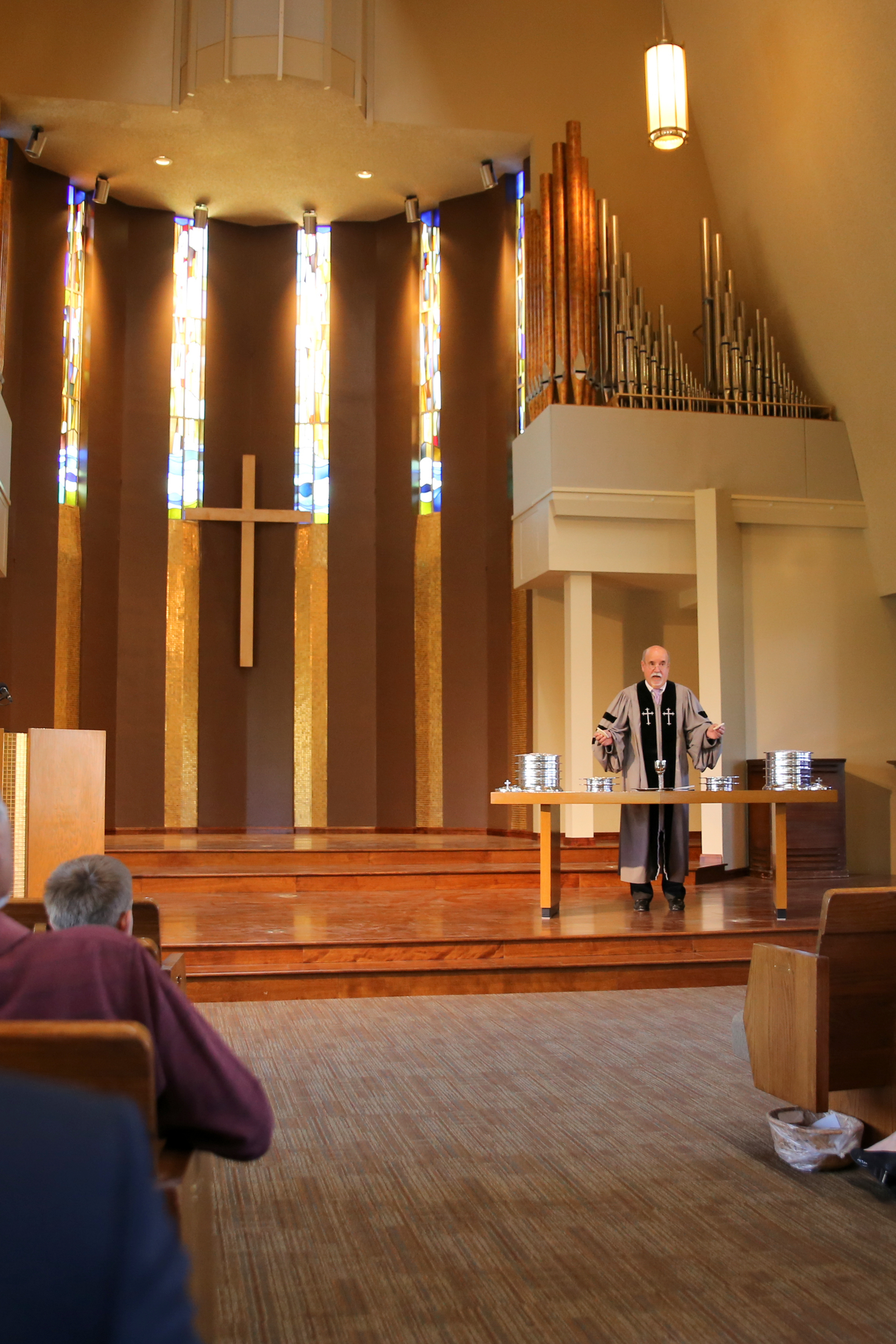Horton and Keller on Center Church (and Law and Gospel)
 Thursday, June 30, 2016 at 10:31AM
Thursday, June 30, 2016 at 10:31AM A bit long, but well worth watching. A great discussion of preaching law/gospel in a culture which knows no guilt or shame.
Living in Light of Two Ages
____________________________
 Thursday, June 30, 2016 at 10:31AM
Thursday, June 30, 2016 at 10:31AM A bit long, but well worth watching. A great discussion of preaching law/gospel in a culture which knows no guilt or shame.
 Tuesday, June 28, 2016 at 10:35AM
Tuesday, June 28, 2016 at 10:35AM  The First in a Series of Sermons on the Epistle of Jude
The First in a Series of Sermons on the Epistle of Jude
It should get our attention when we are reminded of the number and gravity of the warnings to the churches found in the New Testament concerning the threat of false doctrine and false teachers. In the Epistle of Jude, we learn of churches which have been secretly infiltrated by self-appointed spokesmen for God, who were advocating the quite erroneous notion that because we are saved by God’s grace, we are no longer bound to follow God’s commandments. Such false teachers claimed to be followers of Jesus, while at the same time were themselves engaging in all kinds of sexual immorality closely tied to the paganism of the age. By indulging in sins of the flesh, under the guise of God’s grace, Jude says, these teachers were actually denying the gospel of Jesus Christ. Aware that this was going on in the churches, Jude writes a short but very powerful exhortation to Christians in these churches to oppose these false teachers with everything in them. Jude exhorts them to “contend for the faith once for all delivered to the saints.”
We begin a three-part series on the Epistle of Jude–one of the shortest epistles in the New Testament. Jude is the brother of James and half-brother of Jesus. In fact, based upon the list of Jesus’ brothers in Mark 6:3 and Matthew 13:55, Jude is probably James’ younger brother. Having completed a series on both epistles of Peter, and now aware of the literary connection between Peter’s second epistle and Jude, we are in a good position to consider the short epistle of Jude, who leaves us one of the most often-quoted but least practiced exhortations of the New Testament: “Contend for the faith that was once for all delivered to the saints.” In a perilous age such as ours, when far too many Christians are ignorant of the most basic of Christian doctrines, and therefore all too prone to compromise with the paganism all around us, Jude’s exhortation to contend for the faith ought to ring in our ears.
Although the author of this book is the brother of James–who wrote his epistle in the mid-forties of the first century–many argue that Jude was written as much as twenty years after the Epistle of James. This would give us a date of composition somewhere in the mid-sixties, although I think a good case can be made for a much earlier date (the early 50's). If the exact date of this epistle is somewhat up in the air, it is very clear that Jude is writing under a completely different set of circumstances than those facing his brother James. For Jude, the issue which prompts the writing of this epistle is that Christians are under the assault of deceptive false teachers. Christians receiving this letter from Jude are exhorted to wake up and resist those deceivers who had secretly infiltrated their churches. At the same time, Jude’s readers need to make every effort to build themselves up in the most holy faith–perhaps the best defense against false teachers seeking to exploit doctrinally ignorant Christians.
The internal evidence points us in the direction that Jude is writing in opposition to a group of schwarmerai (charismatics), men, who under the pretense of receiving new revelations from God, were defiling their flesh (a reference to sexual immorality), and speaking blasphemously about matters which they claimed to understand, yet knew nothing about. This is very much like the second chapter of 2 Peter. It is clear from Jude’s comments that he is concerned about false teachers already in the churches, men whose conduct in many ways mirrors the false teaching plaguing the church in Corinth (2 Cor. 10-12), as well as two of the churches mentioned in Revelation (Thyatira and Pergamum) which, according to the Apostle John, were facing a similar kind of false teaching associated with a certain “Jezebel.” Based upon comments made by Jude, a good case can be made that the congregation(s) to which Jude is writing were steeped in Jewish mysticism, and plagued by end-times speculation (Jewish apocalypticism). It may be the case that the false teachers were able to appeal to the congregation’s interest in mysticism and end-times as a cover so as to make rapid progress in infiltrating the churches.
To read the rest of this sermon, Click Here
 Monday, June 27, 2016 at 10:32AM
Monday, June 27, 2016 at 10:32AM  Sunday Morning, July 3: This coming Lord's Day, we will tackle the famous "Seventieth Week" of Daniel 9:27. Our worship service begins at 10:30 a.m.
Sunday Morning, July 3: This coming Lord's Day, we will tackle the famous "Seventieth Week" of Daniel 9:27. Our worship service begins at 10:30 a.m.
Sunday Afternoon: We are continuing our study of the Heidelberg Catechism. We are currently covering Lord's Day 12, and answering the question, "why are we called Christians?" (Q & A 31-32). Our catechism service begins @ 1:15 p.m.
Wednesday Night Bible Study: Our Bible study will resume in September with a study of 2 Thessalonians.
Academy: Will resume in the Fall
For more information on Christ Reformed Church you can always find us here (Christ Reformed Info), or on Facebook (Christ Reformed on Facebook).
 Sunday, June 26, 2016 at 03:17PM
Sunday, June 26, 2016 at 03:17PM  Do We Need Another Reformation?
Do We Need Another Reformation?
Five slogans were at the core of the Protestant Reformation: Scripture Alone, Christ Alone, Grace Alone, Faith Alone, and Glory to God Alone. On this program the hosts discuss the theology behind each of these slogans and take calls from listeners in order to evaluate whether contemporary Christianity is in need of a new Reformation (originally aired Sept. 16, 1995).
 Tuesday, June 21, 2016 at 10:06AM
Tuesday, June 21, 2016 at 10:06AM 
The Seventh and Final in a Series of Sermons on 2 Peter
Knowing that his life was likely drawing to a close, the Apostle Peter arranged for the composition of the brief epistle we know as 2 Peter. Part sermon, part letter, there is a profound sense of urgency about Peter’s second letter. In it, the Apostle makes three key points. First, Peter urges that Christians, who are already recipients of God’s grace, manifest those moral virtues which reflect their faith in Christ. These virtues include knowledge, self control, steadfastness, godliness, brotherly affection, and love. Second, Peter warns us that false teachers and false prophets will secretly introduce destructive heresies into the churches, and that Christians ought constantly to be on guard for such disruptive individuals. These men live to indulge the flesh. Although they attract large numbers of followers, God will punish them harshly while rescuing his people from their clutches, just as he did with Noah and Lot. Third, even though the false teachers deny that Jesus will return a second time, it is certain that our Lord will come again to purge the present heaven and earth, removing every trace of human sin, and then creating a new heaven and earth–the home of righteousness. While we long for that glorious day of Christ’s return, Peter exhorts us to wait patiently during this age of salvation, all the while growing in the grace and knowledge of our Lord and Savior, Jesus Christ.
We conclude our series on 2 Peter before we turn to the short Epistle of Jude. Although too often overlooked, 2 Peter is a remarkable letter. It is packed with important apostolic teaching, and reflects Peter’s righteous anger toward those who speak false words and utter false prophecies so as to lead the people of God astray. Peter opens his letter by reminding us of God’s saving grace in Jesus Christ, which not only saves us from the guilt and power of sin, but at the same time empowers us to live Godly lives. As the false teachers and prophets seek to indulge the flesh, Christians should seek to produce those Godly virtues enumerated by Peter in the first chapter of this epistle, all the while waiting patiently for the very thing the false teachers say will not come to pass–the second coming of Jesus, the final judgment, and the creation of new heaven and earth, our eternal home.
As we take up our text, verses 14-18 of chapter 3, we will consider Peter’s concluding exhortations regarding how Christians are to live in anticipation of the age to come. In verse 13, Peter exhorts us to anticipate a new heaven and earth where righteousness dwells. In verse 14, Peter follows up by telling us “therefore, beloved, since you are waiting for these, be diligent to be found by him without spot or blemish, and at peace.” Although there is a danger in being so heavenly-minded that we are no earthly good, those who live their lives in anticipation of the next life, do indeed long for the new heaven and earth, where every hint and trace of sin are gone, and where everlasting righteousness dwells.
For the Christian, then, the final judgment is not something we are to fear–because we are clothed in the perfect righteousness of Jesus, who has also died for all of our sins. Rather, the final judgment is that day when every tear is wiped from our eyes, every injustice made right, and when we at long last enter the eternal state to dwell forever in the new heaven and earth described by the Apostle. It is well worth noting that some three times in this concluding section, Peter speaks of Christians “looking forward” (prosdokaō) to events associated with the end–especially the creation of a new heaven and earth.
To read the rest of this sermon, Click Here
 Monday, June 20, 2016 at 10:34AM
Monday, June 20, 2016 at 10:34AM Sunday Morning, June 26: We will consider Daniel's famous prophecy of the "Seventy Weeks" (Daniel 9:20-27). Our worship service begins at 10:30 a.m.
Sunday Afternoon: We are continuing with our study of the Heidelberg Catechism and are currently looking at Lord's Day 12 -- Jesus as King (Q & A 31-32). Our catechism service begins @ 1:15 p.m.
Wednesday Night Bible Study: Our Bible study will resume in September with a study of 2 Thessalonians.
Academy: Will resume in the Fall
For more information on Christ Reformed Church you can always find us here (Christ Reformed Info), or on Facebook (Christ Reformed on Facebook).
 Sunday, June 19, 2016 at 03:53PM
Sunday, June 19, 2016 at 03:53PM  Sunday, June 19, 2016 at 03:41PM
Sunday, June 19, 2016 at 03:41PM  Engaging the Culture Without Losing the Gospel
Engaging the Culture Without Losing the Gospel
The culture is changing all around us, and Christians are no longer in the majority. But is this a time for despair or an opportunity to recover our own distinctive message? On this program Michael Horton discusses these issues with Russell Moore, president of the Ethics and Religious Liberty Commission of the Southern Baptist Convention, and author of Onward: Engaging the Culture Without Losing the Gospel.
 Sunday, June 12, 2016 at 09:52PM
Sunday, June 12, 2016 at 09:52PM 
I'm off this week to the Synod of the URCNA, held at Bethany URC in Wyoming, MI. Things will be a bit quiet around here until I return.
